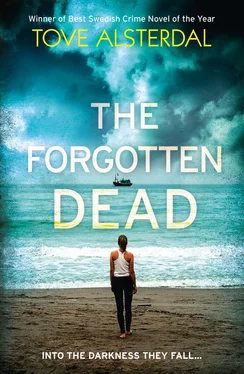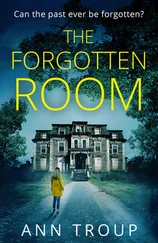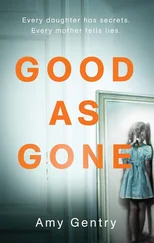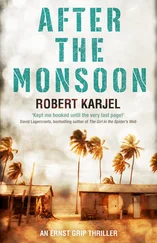I got out my cell and started with the number on the very last page of the notebook. Later, when the rain stopped, I would go to see the places marked on the map. Force my body into this upside-down day and night, not wanting to waste any time.
The call went through. I glanced at the name: Josef K. Two ringtones. Three. A girl was wiping off the nearby table. A couple of tourists were talking loudly in Italian.
Then I heard a click on the phone, but no voice answered. The line was simply open, and I could hear the sound of traffic, a siren far away.
‘Hello?’ I said quietly. ‘Is there someone there named Josef? Hello?’
I was positive I could hear someone breathing.
‘I’m actually looking for Patrick Cornwall, and I wonder if you could help me. I’m in Paris, and I think he called this number and—’
The traffic noise stopped. Whoever it was had ended the call.
With a tight grip on my cell, I moved on to the next number on the list.
After four attempts to speak to someone, I gave up. The most extensive answer I’d heard was ‘ no English ’ and ‘ no, no, no ’.
I was seized with longing to call Benji instead. To hear how the opening night had gone. And whether Duncan had won the acclaim he’d wanted. But all of that seemed so distant, as if it had ceased to exist the moment I boarded the plane.
Benji was the only one who knew that I’d gone to Paris. I’d told him at lunch, when we were sitting on the steps of the loading dock on 19th Street, eating burritos with jalapeños from the deli across the street.
‘You’re out of your mind. I can’t handle everything on my own,’ said Benji, missing his mouth. A big dollop of meat fell onto his lap, along with some melted cheese and a limp slice of tomato. ‘What if something happens? What do I do then?’ He tried to rub the spot off his baggy designer jeans.
‘Nothing’s going to happen,’ I said. ‘The stage set is all done, and they’re going to dance this same performance for three weeks. I’ll be back long before then.’ I stuffed my half-eaten burrito into the empty juice container and stood up.
‘If anyone asks,’ I said, ‘just say that something has come up in my family, and I’m terribly sorry, et cetera. That’s all anyone needs to know.’
An hour before the curtain-up, I left the theatre. By then all the paperwork was in order: the account books and the certificate from the fire department inspection, the list of props that had to be returned — all in neat folders. Like a final accounting of that part of my life.
‘Kiss Patrick when you see him,’ said Benji, giving me a hug. I pulled away and didn’t reply, just waved as I ran out to the cab that would take me to Newark and the Air India flight to Paris, leaving at 21.05.
The pill was supposed to be taken no later than an hour before departure, but I’d sat with the blister pack of pills in my hand until the gate was ready for boarding. There was no way I was going to allow myself to be carried through the air in a closed tube without some sedative inside my body. I’d suffered from claustrophobia as long as I could remember, and it wasn’t just rooms with the door closed, basement apartments, and elevators. Sitting captive in an aeroplane or a subway was even worse. It was impossible to escape. There was no way out. I was at the mercy of other people, with no power over my own fate. That was probably why I became a set designer. In the theatre I built my own rooms and decided where the exits would be. Usually I was able to deal with my claustrophobia. I always checked to see where the emergency exit was when I entered a building, and I never rode the subway. If I needed to travel any distance, I hired a car. Going back to Europe had never been part of my plans.
I read the warning label over and over. If pregnant, consult your doctor, it said. And ‘there is a risk the foetus may be affected’. Forgive me, I thought as I swallowed the pill. Forgive me, but I have to do this.
The cab crept along the glittery Champs-Élysées and turned off right before the Arc de Triomphe. That’s where all the hustle and bustle ended. Rue Lamennais was lined with businesses, and most of the employees seemed to have gone home for the day. I asked the cab driver to pull over before we reached number 15, which was one of the addresses in Patrick’s notebook.
I stopped twenty metres away, ducking into the shadow of a doorway. A car slowly passed and slid to a halt in front of the entrance. Then another equally shiny vehicle arrived. The first was a Bentley, the second a Rolls Royce. Three men wearing dark suits came out of the building carrying briefcases. A doorman hurried forward to open the car doors, bowing and anticipating every step the men took in an obsequious dance. There was even a red carpet on the pavement. The cars started up and disappeared.
This was the second address I’d gone to see. The first had turned out to be an American bookshop. Typical Patrick. He loved to ferret out old editions of classic novels that cost a tenth of the price in paperback. I’d roamed around inside among millions of dusty books, up and down narrow stairways, past benches with cushions and blankets squeezed in between the aisles. When I sat down to take a brief rest, two hikers with backpacks came over to ask me if I was an author. ‘We’re authors too,’ said the boy. ‘But we publish our writing on the Internet. We think of ourselves as akin to the beat generation, but in a whole different context, of course.’
It was now six thirty, and dusk was hovering like a blue note in the air. Yet another shiny car glided past, this one a Jaguar. At that moment my cell rang in my shoulder bag. The doorman glanced in my direction. I looked at the display. Unknown caller.
‘Ally,’ I said.
‘You called?’ said a woman with a French accent. ‘You’re looking for Patrick Cornwall?’
Adrenaline coursed through my body. My knees felt weak.
‘Do you know where he is?’ I said. ‘I need to get hold of him.’
A brief pause on the line. No background noise.
‘We can’t talk on the phone,’ said the woman. ‘Where are you right now?’
‘On a street called rue Lamennais,’ I said. ‘Outside a restaurant.’ I quickly moved closer so I could read the gold script on the visor of the doorman’s cap.
‘Taillevent,’ I said.
‘In the eighth?’ said the woman.
‘Excuse me?’ I asked, thinking instantly of the baby. The eighth sounded like a month at the end of the pregnancy. ‘What do you mean?’
‘The eighth arrondissement,’ she said. ‘In half an hour. How will I recognize you?’
‘I’m wearing a red jacket,’ I said, and then she clicked off. I lowered my hand holding the cell and smiled at the doorman.
He smiled back.
‘Good news?’ he asked.
‘I think so,’ I said, and put my phone away in my bag, going over the conversation in my mind. Thinking about the tone of the woman’s voice. Formal but not hostile. I strained to remember the fruitless phone calls I’d made earlier in the afternoon, but they all merged into one. It didn’t matter. I’d soon find out.
Читать дальше












